As Cambridge Judge Business School celebrates 25 years of first-class business education, we ask the School’s Directors in turn for their memories, their proudest moments – and what they believe makes Cambridge Judge one of the best business schools in the world.
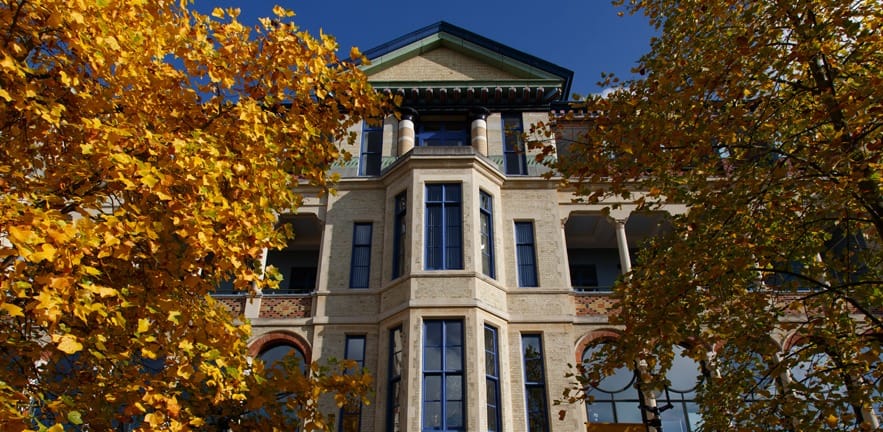
Stephen Watson (Founding Director)
1990-1994
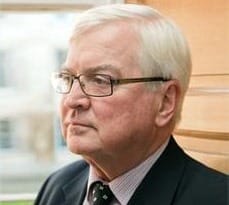 I remember the idea of a Cambridge business school growing gradually. Although some universities had embraced business studies for years – Birmingham and Manchester offered commerce degrees before the war – in the 1980s it was still seen by some at Cambridge as a lightweight subject of questionable value.
I remember the idea of a Cambridge business school growing gradually. Although some universities had embraced business studies for years – Birmingham and Manchester offered commerce degrees before the war – in the 1980s it was still seen by some at Cambridge as a lightweight subject of questionable value.
But all the plate glass universities had business schools and it seemed ridiculous that Cambridge didn’t. I had been Head of the Management Studies Group in the Department of Engineering and we found students were coming for our management studies courses who weren’t engineers. There were about 10 of us on the staff who believed a business school was the way forward but a lot of people needed convincing; it was very much a bottom-up process. There was no central plan. Between us we developed courses, including the Management Studies Tripos in 1986, and managed to get an endowment for a professorship [which saw Professor Watson become Cambridge’s first Professor of Management Studies]. It was only then that the University began to think strategically about a business school.
We wanted to make sure that what our cohort was studying was an honest subject. Harvard famously had resisted opening a school for a long time, partly because of fears it would teach a lightweight subject and also because of the feeling it would naturally attract more money from business than the rest of the university. There was a feeling that “people who are not even doing a proper subject are getting bigger salaries than other departments” and I think there were a few similar mutterings in Cambridge.
One point in our favour was we were all people from different disciplines – my background was in mathematics and we had economists and sociologists. This diversity of support for the establishment of a school really helped to push it forward – it helped us to prove the intellectual worth of management studies.
A University report in 1989 considered five possible ways to set up the school, with number five the most ambitious – a “Harvard on the Cam”. We trod cautiously and went for number four: we offered an MPhil and an MBA and Cambridge’s business school grew from there. It was 1989, Thatcher was still on the throne – it was a perfect time to embrace the business zeitgeist.
Dame Sandra Dawson
1995-2006
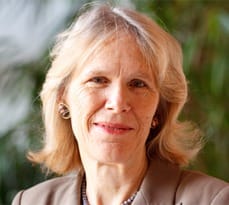
I came to the Judge Institute of Management Studies, as it was then, with an enormous sense of belief in the potential of this place. I felt Cambridge was very fertile ground for building a distinctive business school – and so it proved to be.
Our challenge was to build a culture and spirit of excellence, collaboration, innovation and respect, and we succeeded in part because we celebrated and emphasised our part in the first-class university around us. We built strong interdisciplinary alliances with Cambridge colleagues, with alumni, with donors and, of course, the business community as we expanded our excellent faculty and increased our programmes. I worked with a combination of impatience – I always wanted more – and optimism, because I never doubted that we would be successful.
As the Institute climbed up the rankings we built a broad base of support for the change of name from Judge Institute of Management Studies to Judge Business School. Several misconceptions needed to be overcome through our words and deeds as a base for a name change. For example if we became a business school would it mean we were not also interested in issues of organisation and people in the public or charity sector? On the contrary, we always believed that participation of people and organisations from those sectors in our teaching and research would enrich us, and nurture respect for a breadth of experience that would enhance our understanding of effective management and leadership in diverse contexts. Or would it mean that in dropping the word “Institute” we would be less interested in research? Fortunately our track record shows such fears were unfounded.
Coincidentally with building degree programmes and executive education, we were eager to invest in an environment and faculty development that nurtured and expected strong cutting edge research that would stand strong in peer review. At the same time we sought to support a search for knowledge that would, from time to time, have real and important impact in, and with, the organisations and institutions with which we collaborated. We can see the roots here of the strategy of deep engagement which is being championed by Christoph Loch.
We had a fundamental determination to be at the heart of the University, physically, intellectually and within the colleges. The aspect that differentiated us from standalone business schools was the embedded nature of our relation to Cambridge.
We achieved the standing to which we aspired and laid the foundation for yet more to be done. A lot of what happened, happened because Cambridge Judge is unique, and those who come through its distinctive “porthole doors” usually find that they can make a special contribution to the advancement of knowledge and leadership in future generations who in turn will make a difference for good in their chosen fields.
Arnoud De Meyer
2006-2010
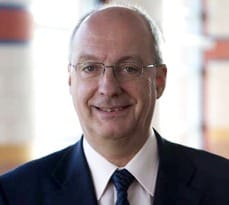
In 2006 I had been at INSEAD for 23 years and was looking for a new challenge. I was asked if I would be interested in Cambridge and of course I was – I thought it had an outstanding reputation. But I also came to Cambridge thinking it had always hidden its light under a bushel, and I think that was confirmed when I arrived and found it was even better than I had expected.
I was immediately impressed with the quality of the faculty, and the outstanding researchers with their high commitment to the school. But I could also see the potential of greater interdisciplinary links. The MBA programme was excellent but I felt it was undersold – when you’re part of Cambridge you need to celebrate that.
So I set out the direction, but of course you can’t lead unless people follow and the School would not have developed in my time without an excellent team of people such as Stefan Scholtes, Geoff Meeks, Danny Ralph and many others. And together we moved the School on in a number of ways.
Course-wise, I launched the MFin [Master of Finance] and the Executive MBA and in doing so successfully created a portfolio of programmes. With Stefan Scholtes I also brought our excellent research into the mainstream academic publications – I did think that because Cambridge is a place of such academic excellence, it sometimes risked being a little too parochial, so we brought in more benchmarking with the outside world.
Another major development was PR – not advertising, but things like bringing journalists in to have lunch with the faculty, showing them what we did, how we worked with business and promoting ourselves as “Judge” rather than “the Cambridge business school”. I spoke to international forums, giving us an outside presence in the UK and continental Europe, and the quality of speakers we brought in and got to interact with our students showed we were a platform for thought leadership.
When I arrived there was a little bit of executive education that was sold through a third party, but I stopped that and we went into open enrolment. In the time I was there in real terms our executive education had grown six- or seven-fold. We made Cambridge Judge a force to be reckoned with within business itself.
But what makes Cambridge Judge unique is its position at the heart of the Cambridge learning environment. When it became Judge there was a big risk of isolation, of it becoming too independent. So we also strengthened the interdisciplinary links, developing genuine two-way learning relationships within that academic environment with engineering, mathematics and a host of other departments. Yes, Cambridge Judge is independent, but integrating within a university which has so much talent means there is so much more you can do.
At some places I have worked I have felt the limitations of a standalone business school. But I never felt that at Cambridge – the possibilities for interdisciplinary networking and sharing of ideas are boundless.
Geoff Meeks
2010-2011
I’m the odd one out. Whereas Sandra, Arnoud and Christoph were volunteers from outside Cambridge, I’d been at CJBS for seven years as professor, Director of Teaching, and Finance Group Head before I was conscripted to the Dean’s role for the interregnum between Arnoud and his successor.
I was to shadow, then act, until the new dean was installed: 18 months later if all went well with recruitment. This was a short tenure by Cambridge standards, but not extraordinary for prominent European business schools, where deans had been ditched within a year or two – “like managing a football club,” said a Cambridge Pro-Vice-Chancellor to me, with a menacing smile.
The results that counted most in published league tables for business schools were placing students in highly-paid jobs and placing research papers in prominent American journals. Thanks to the work led by Sandra and Arnoud, Cambridge Judge was already making strong progress in these areas, while not sacrificing for the sake of the league tables bright students and faculty who were pursuing less conventional aims.
A priority for me was to retain and recruit people who would maintain that progress – but with a much tighter budget than the competitors who headed the league tables (one US business school had recently received a single gift of $400 million; another told me they “didn’t have a budget constraint”).
But we had access to riches of another sort, intangible assets that few others could match – the Cambridge “brand” and talented Cambridge people and alumni eager to help us. So, before and during my time as Dean I tried to harness these assets in areas where we had a realistic hope of becoming a world leader. Examples include our MPhil degree in Finance, to which Cambridge mathematicians and economists contributed, and which was the most over-subscribed graduate degree in Cambridge; our charitable (UNICEF), Chinese (CELP), conservation (CCI), energy (EPRG), health (CCHLE), and legal (PSF) initiatives – all drawing distinctively, and with distinction, on Cambridge and its friends; or our new Master of Finance degree which, unconventionally, enlisted practitioner alumni and friends, and went straight to second place in the global rankings.
Donations too came to Cambridge Judge from alumni of other Cambridge departments – an eight-figure total in my spell to kick off our building programme and fund-visiting faculty from overseas.
Particularly memorable for me were the brilliant University officers, Advisory Board members and CJBS colleagues who would drop everything to help the Dean grab an opportunity, keep out of court or grapple with an unfamiliar question. One such question arose with a programme I had inherited in a turbulent country. “There will of course be an armed guard for the Cambridge staff in the hotel; but do you want an armed guard in their car? That would attract attention and likely get them shot or kidnapped.”
Christoph Loch
2011-
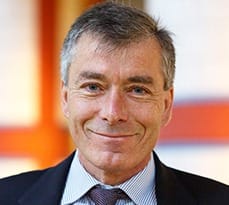
Standing on the shoulders of my predecessors, I’m extremely proud of the fact that Cambridge Judge successfully competes in the top tier of global business schools, in an age when this normally is not quite possible to achieve.
We went from a curious start-up within the venerable University of Cambridge (which did not really want a business school), through a phase of creative experimentation in our MBA, then we successfully demonstrated quality in research, showing that we embodied the academic standards of the University, and we have now established a standard in teaching and research that allows us to define our own differentiated position in the pack of business schools with an ambition to be globally leading. But what of the future?
The competitive publication game, striving for “intellectual leadership”, carries a strong temptation to seek ever-deeper disciplinary research, moving into “base disciplines” such as economics, sociology, psychology, engineering. But such research cannot do justice to the “systems science” character of business studies. Business studies need, in order to be relevant, to look for phenomena that usually arise from the interactions among the base disciplines but, more importantly, matter for real organisations because they occur in the messiness of organisational life.
In other words, we want, as a business school, to have impact on organisations, based on (methodologically clean) research rather than superficial business analytics. We do already have impact: we help a global charity to improve their effectiveness by helping them run field experiments; we are helping a hospital to reorganise for better efficiency (without losing quality); we are helping a large organisation to put innovation into practice; and we are helping Cambridge startups to succeed in turning their technical ideas into businesses. All of this while turning the engagement with the organisations into knowledge that can be shared with others, through relevant publications. While every business school has a few “war stories”, we want to make this systematic.
We are exposing our faculty (including the junior colleagues) to opportunities to work with organisations, we are supporting them with mentoring and with resources, and we are hiring faculty who have an interest in working with organisations. But as engaging with organisations takes time, we have adjusted our internal promotion criteria, complementing a low “number” target for publications in top journals by evaluating work for innovativeness and relevance.
We are beginning to see the first fruits of these measures – in our executive education engagements with companies, and in the fact that organisations (private and public) have started sponsoring research that will produce a short-term report as well as data that will support further-reaching research. In a couple more years, we aim to have research that “sticks out” as being both elegant as well as addressing real problems that matter.
This research will help us to engage with students and executive education partners in ways that really make a difference for them, as well as learning more and more ourselves. The cumulative effect of these efforts will be a superior ability to achieve high impact based on quality research, and will ensure CJBS continues to be an integral part of the University of Cambridge.

